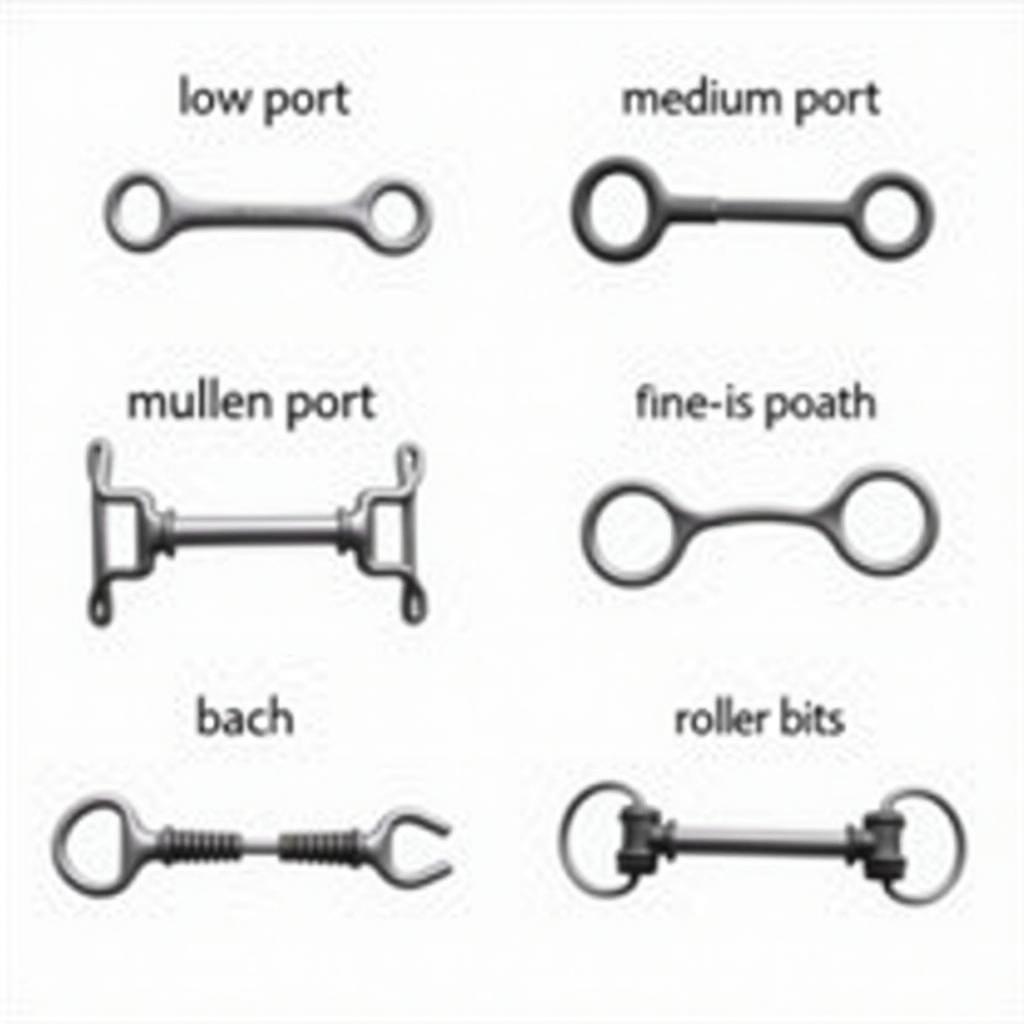Ported Bits For Horses are a common choice among riders, offering a unique balance of control and comfort. This article will delve into the intricacies of ported bits, exploring their various types, benefits, and potential drawbacks. We’ll also discuss how to choose the right ported bit for your horse, ensuring a positive riding experience for both horse and rider. Let’s uncover the world of ported bits and equip you with the knowledge to make informed decisions for your equine companion.
Choosing the right horse trailer ramp is essential for safe and easy loading and unloading. Learn more about the best options available for your needs in our article about ramp for horse trailer.
What are Ported Bits for Horses?
Ported bits differ from solid bits primarily due to the presence of a port, a raised central section on the mouthpiece. This port creates a space for the horse’s tongue, alleviating pressure and potentially providing a more comfortable experience. The shape and size of the port can significantly impact the bit’s action, ranging from mild to more substantial.
Types of Ported Bits
Several types of ported bits exist, each designed with specific considerations in mind:
- Low Port Bits: Offer subtle tongue relief and are often suitable for sensitive horses.
- Medium Port Bits: Provide more tongue space and can encourage a relaxed jaw.
- High Port Bits: Have a higher port, which can exert more pressure on the palate and are generally used for horses requiring more control.
- Mullen Mouth Bits: Feature a straight bar with a slight curve and offer even pressure distribution across the tongue. Although technically not ported, they provide tongue relief similar to a low port.
- Roller Bits: Incorporate rollers within the port, intended to encourage salivation and prevent the horse from fixing on the bit.
 Variety of Ported Horse Bits
Variety of Ported Horse Bits
Benefits of Using Ported Bits
Ported bits can offer several advantages:
- Tongue Relief: The primary benefit is the reduced pressure on the tongue, providing comfort and potentially preventing tongue evasions.
- Enhanced Communication: By alleviating tongue discomfort, ported bits can facilitate clearer communication between horse and rider.
- Encouraged Relaxation: Some horses respond positively to ported bits by relaxing their jaw and accepting the bit more readily.
Potential Drawbacks of Ported Bits
While ported bits can be beneficial, it’s essential to be aware of potential drawbacks:
- Palate Pressure: Higher ported bits can exert pressure on the palate, which can be uncomfortable or even painful for some horses.
- Nutcracker Effect: Certain port designs can create a “nutcracker” effect, pinching the tongue and bars of the mouth if used incorrectly.
- Bit Fixation: Some horses may fixate on the bit, negating the intended benefits of the port.
Choosing the Right Ported Bit
Selecting the appropriate ported bit requires careful consideration of your horse’s individual needs and sensitivities. Factors to consider include:
- Horse’s Mouth Conformation: The shape and size of your horse’s mouth play a crucial role in determining the suitable bit type and size.
- Riding Discipline: Different disciplines may benefit from specific bit types.
- Rider Experience: Riders should have the necessary experience and knowledge to use ported bits effectively.
- Professional Guidance: Consulting with a qualified equine dentist or bitting specialist is highly recommended, especially if you are unsure which bit is best for your horse.
Looking for a reliable and comfortable horse trailer? Explore the Sirius horse trailer, designed with your horse’s well-being in mind. Check out our sirius horse trailer page for more details.
Conclusion
Ported bits for horses can be a valuable tool when chosen and used correctly. By understanding the various types, benefits, and potential drawbacks, you can make informed decisions to ensure your horse’s comfort and enhance your riding experience. Remember to prioritize your horse’s well-being and seek professional guidance when needed. A well-chosen ported bit can contribute to a harmonious partnership between horse and rider.
 Rider and Horse with a Ported Bit
Rider and Horse with a Ported Bit
FAQ
- Are ported bits suitable for all horses? No, not all horses benefit from ported bits. Some horses may find them uncomfortable, especially if the port is too high or the bit is used incorrectly.
- Can a ported bit help with tongue evasions? In some cases, a ported bit can alleviate tongue pressure and discourage evasions. However, it’s crucial to address the underlying cause of the behavior.
- What is the purpose of the rollers in a roller bit? Rollers are designed to encourage salivation and prevent the horse from fixing on the bit.
- How do I know if a ported bit is the right choice for my horse? Consulting with a qualified equine professional is highly recommended to determine the most appropriate bit for your horse’s individual needs.
- Can I use a ported bit for any riding discipline? While ported bits can be used in various disciplines, certain types may be more suitable for specific activities. Consult with a trainer or bitting specialist for guidance.
- What are the signs that a ported bit is not fitting my horse correctly? Signs of discomfort may include head tossing, excessive salivation, gaping, or resistance.
- How often should I check my horse’s bit for wear and tear? Regularly inspect your horse’s bit for signs of damage or wear and replace it as needed to ensure your horse’s comfort and safety.
Need assistance with choosing the right ported bit? Contact us at Phone: 0772127271, Email: justushorses@gmail.com or visit us at QGM2+WX2, Vị Trung, Vị Thuỷ, Hậu Giang, Vietnam. We have a 24/7 customer service team.